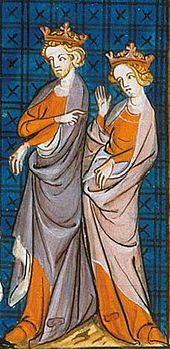 |
| Henry and Eleanor |
Probably one of the most difficult things to do when
studying history is keeping names, events, and dates coordinated. Like a novel
with many plot lines and characters, it can be a challenge to follow the story.
When I looked at the calendar and saw “Henry II” as the saint whose feast is
commemorated today, I had a first confused thought of Thomas a Becket’s Henry II. Such a man as that Henry
could not have been made a saint. Even though he did penance for his part in
Thomas’ martyrdom, he did not lead an exemplary life of heroic virtue. No, the name on the calendar was that of a Henry II who lived 150 years earlier in Germany and was not merely a
king, but a Holy Roman emperor. Naturally, it would be easier to keep the two Henrys
clear if Emperor Henry’s name was not anglicized in history
books, but remained the original, very German “Heinrich.”
| Heinrich and Kunigunde |
Unlike the English Henry II’s queen, Eleanor of Aquitaine, Emperor Henry II’s queen, Kunigunde, is
a canonized saint. Whereas Emperor
Heinrich worked in the 11th century to strengthen the Church in his empire and promote reform, King
Henry a century later tried to weaken the Church’s authority in his English realm. As is often
the case, though, the English Henry has more notoriety because of the trouble he
caused. As Shakespeare’s Marc Antony noted, “The evil that men do lives
after them; the good is oft interred with their bones.”
In Butler’s Lives of the Saints the entry for today’s royal saint ends with this profound thought:
Those who by honors, position, wealth, or talents are raised by God above the level of their fellow creatures in the world have a great stewardship and a rigorous account to give at the bar of divine justice; for their very example has a most powerful influence over others. This St. Fulgentius observed, writing to Theodore, a Roman senator. “Though,” said he, “Christ died for all men, yet the perfect conversion of the great ones of the world brings great acquisition to the kingdom of Christ. Those in high places must necessarily be to many an occasion either of eternal perdition or of salvation. And as they cannot go alone, so either a high degree of glory or an extraordinary punishment will be their everlasting portion.”
May we remember and follow the Good Henry.
Please Note: Today is the last day to enter the giveaway.
No comments:
Post a Comment